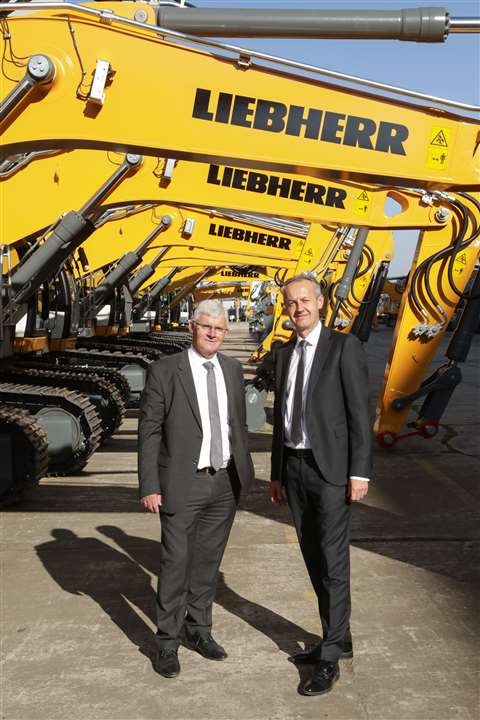Interview: Christophe Sanchez, Liebherr-France
09 February 2022
Christophe Sanchez is a man with big shoes to fill.
 Christophe Sanchez (on right) alongside his predecessor Martin Schickel. (Photo: Liebherr-France)
Christophe Sanchez (on right) alongside his predecessor Martin Schickel. (Photo: Liebherr-France)
As managing director of Liebherr-France, a position he started last November, he is tasked with following Martin Schickel, who became an institution at the Colmar-based equipment manufacturer in a career spanning the best part of half a century.
He is quick to pay tribute to his predecessor: “For sure, the career path of Martin Schickel was exceptional. He was in the Liebherr group beginning in production in the 1970s and finishing as managing director of the Liebherr-France factory.
“I personally have great respect for what he achieved. I think his dedication to the group was, for all of us, exemplary.
“We actually started to work closer together in 2015. He was general manager of Liebherr-France and I was managing our Italian branch at that time. I think we did a good job together in developing a market which is not renowned for being one of the easiest.
“We immediately got on very well, probably because we share the same values.”
Now out front on his own – and already with 20 years of experience at Liebherr-France behind him – Christophe’s appointment coincided with the 60th anniversary of the opening of the Colmar factory in the east of the country.
It would be wrong to say he is planning any major changes – “our division has a long-term vision, and my actions will align with our global business strategy” – but he is aware that these are significant times for the business.
“The challenges we will face in the coming years are different from the ones my predecessors took up in the past.
“But we are aware of the opportunities for product development, and we are working actively on new technologies to meet the environmental challenges our industry faces.
“This will keep us busy for the next 10 years, at least.”
The demolition sector was already keeping the French operation busy before the enforced halt to production that the Covid-19 lockdown brought about two years ago.
Since the factory reopened, demand has increased, with turnover from demolition machines up by more than 20% on pre-pandemic levels.
“Demolition is a key part of our business, it is very important for us,“ says Christophe.
“In the past 18 months, we enlarged our portfolio with two new models, the R940 – a 64 t machine with 23 m (75 ft) high reach – and the R980, which is the biggest one at 190 t and 55 m (180 ft), so we were able to take advantage of this trend.
“As a manufacturer we have to anticipate how demand is supposed to move in the future. Everyone is working at reducing their own carbon footprint, and so are our customers in the demolition business.
“We are aware that there is not one solution, there is a range of solutions, and that is why we are developing new technologies – hydrogen engines, technology with fuel cells, battery electric and fully plugged-in electric machines.
“And mobility is a big component of the demolition business, so we see a demand for alternative technologies, for small machines, and we will need some time to come up with solutions that are interesting for our customers.”
STAY CONNECTED


Receive the information you need when you need it through our world-leading magazines, newsletters and daily briefings.




